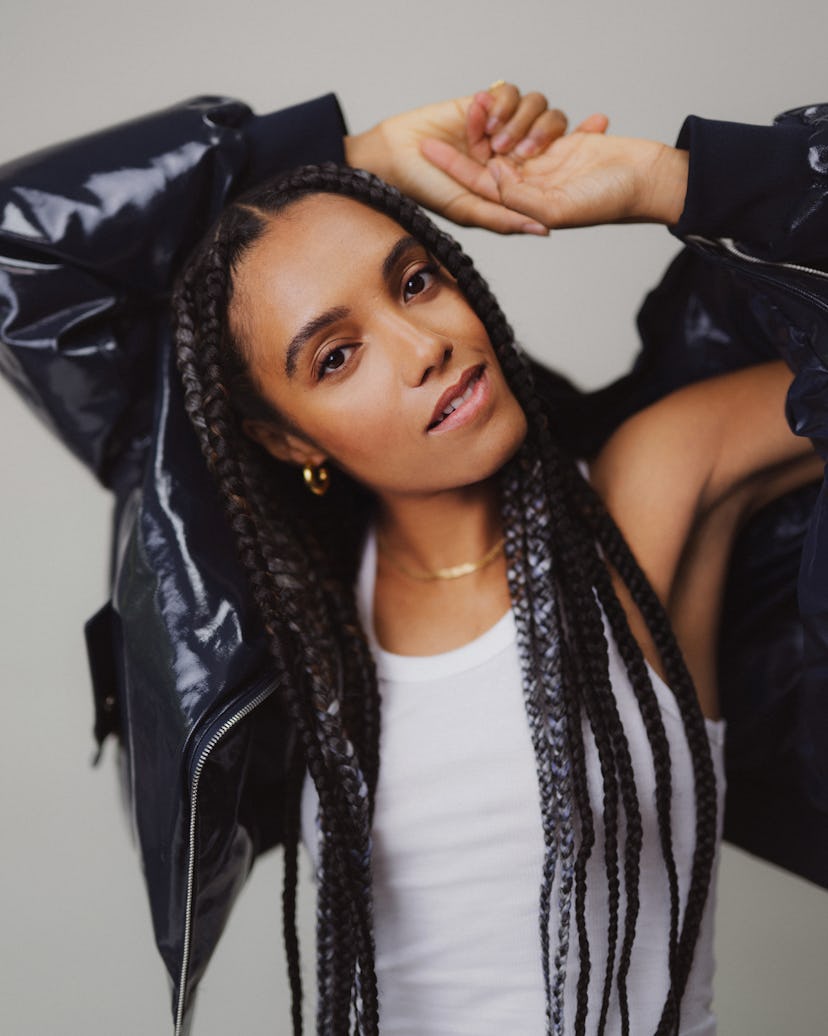If knowledge is food for the brain, Maisie Richardson-Sellers’s mind has an insatiable appetite. As a student at Oxford, the actor (who uses she/they pronouns) would pull frequent all-nighters in her university library. That tireless dedication to research has persisted in her work on both sides of the camera. In preparation for directing an episode of the superhero series Legends of Tomorrow set in Sarajevo during Franz Ferdinand’s assassination, she honed in on the finer details: What clothes were they wearing? What food did people eat? Even within the fantastical realm of the superpowered, she wanted the viewer to “really taste and smell and feel like you’re in a real world.”
After breaking out in Legends and in The Kissing Booth films as Jacob Elordi’s college bestie, Richardson-Sellers’s latest project, the speculative political drama The Undeclared War, presented a much-needed tonal departure that catered to her intensive process. “I was just craving telling a very organic, true, gritty, human story where the emotion of everyday life is put at the center of it,” she tells me over the phone. “It was also an opportunity for me to really study and learn about an area that I think will affect our lives very soon.”
Set in 2024, The Undeclared War imagines the very real possibilities of global conflicts migrating from the battlefield to our computers, as cyber warfare unfolds between the UK and Russia. Drama is told on desktops, as data analysts—like Richardson-Sellers’s NSA transplant, Kathy—discover secrets in computer codes. Predicated on authenticity, it’s a dense show that demanded its fair share of homework. Writer Peter Kosminsky provided “pages and pages of backstory,” while Richardson-Sellers sought insight from YouTube videos of whistleblowers.
Beyond the mechanics of a career in cybersecurity, Richardson-Sellers delved into how one of the most secretive professions in the world affects the psyche. Above all, elusiveness is key. “You can’t have too strong of an accent,” she explains. “You can’t look too out of place, and you have to be able to just disappear. You can’t even talk to your partner about what you’re doing at work.”
As for Kathy, a queer Black woman navigating the “homogenous, white male world” of cybersecurity, those effects are only compounded. It was an experience that resonated deeply with Richardson-Sellers. Growing up, she was the scholarship kid in private schools, and, of course, educational establishments don’t get more exclusionary than Oxford. The actor earned a degree in anthropology and archaeology, a kind of secret weapon she uses to enhance her performances. After all, acting, at its core, is about understanding people. Even a show as technically intricate as The Undeclared War taps into something innately human.
“We did a whole course on the rise and fall of empires,” she says. “What this show is about is the slow crumbling of control as a giant threat is imposed. I think there are lots of patterns that we as humans keep going through, but we’re almost too ignorant to realize it’s happened. We’re not learning from the past, we just keep reliving the same thing. That’s something you see a lot in the collapse of empires throughout history.”
From the beginning, Richardson-Sellers knew she would act, but as she found herself enmeshed in academia at Oxford, she imagined a different future: a career in documentary filmmaking. It was the ideal line of work that combined her passions for people and education. “I had this vision of myself living in the Amazon with an incredible tribe for six months to a year and just filming and fully immersing myself,” she says. “It’s always been in my heart.” Drawing from her Guyanese heritage, she wants to tell stories from a “personal lens.” “So much of the work I want to create is about marginalized individuals and communities,” she adds. Her filmmaking inspirations—Barry Jenkins, Céline Sciamma, and Dee Rees—reflect those interests in the intimate portrayals of the underrepresented.
As acting took precedence, those directing dreams were put on hold, but now that Richardson-Sellers has the resources, she’s working to finally make that vision a reality. She can’t get into the details but she tells me about an "amazing community that I've come across who are in the Amazon.” Putting together a documentary is a “slow, long process,” in part because she wants to approach the subject matter with utmost sensitivity.
“A lot of it is building trust,” Richardson-Sellers says about the project. “Making sure that I know enough to truthfully represent them. You have to be conscious of going into a community and exploiting them. One of the consequences of putting them on screen is safety. What am I going to give back to the community? You can’t just go there, film, and leave; it's more nuanced and complicated than just telling a fictional story.”
From anthropology to directing, what ostensibly connects these disparate ventures is a clinical approach to research—but an endless curiosity and adoration of humanity drives Richardson-Sellers, even when the world doesn’t reciprocate. “One of the things that I feel is missing in so many ways is empathy,” she says. “The willingness to take the time to listen and learn from people who have had different journeys and experiences. I think if I can bring new kinds of understanding and respect to people when they are approaching others, that means I've achieved what I want to do in this world.”
